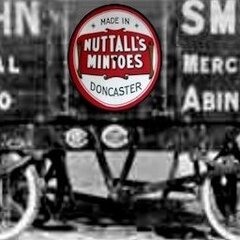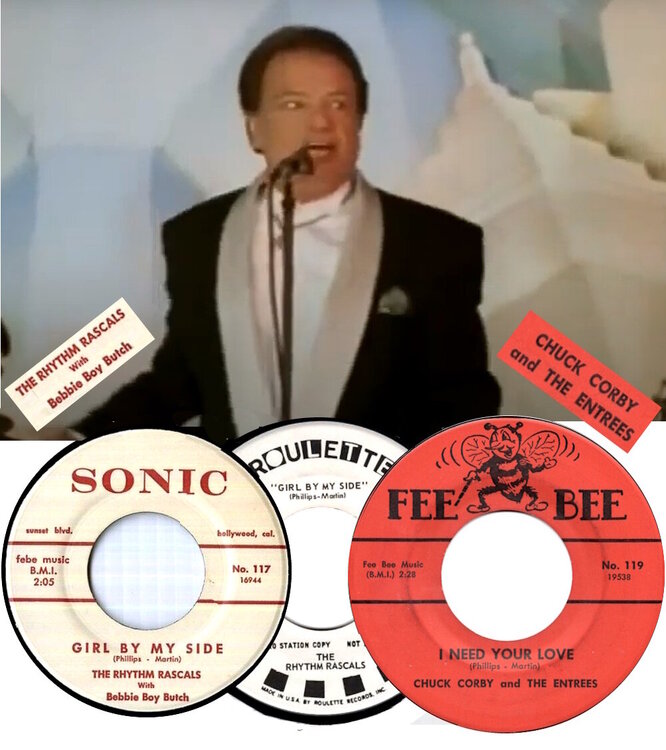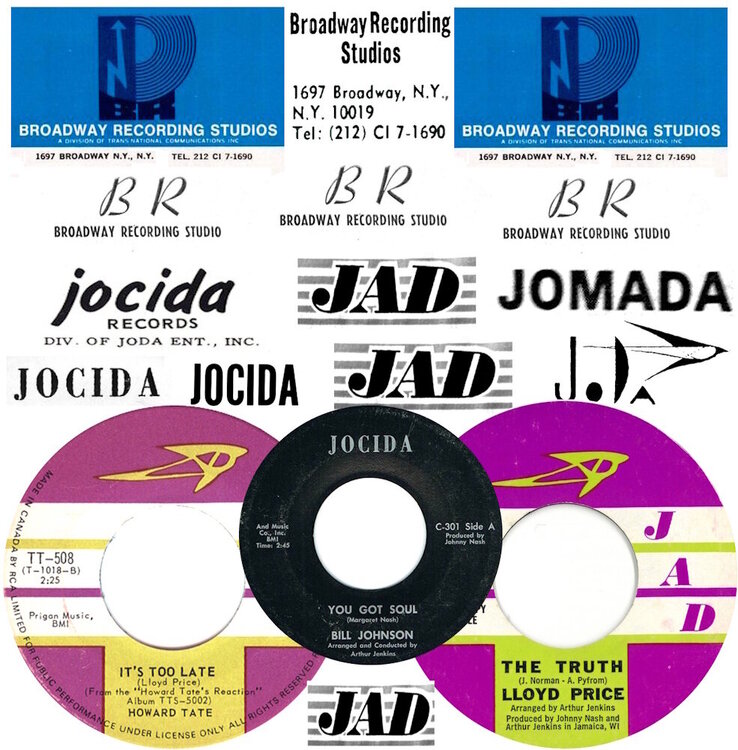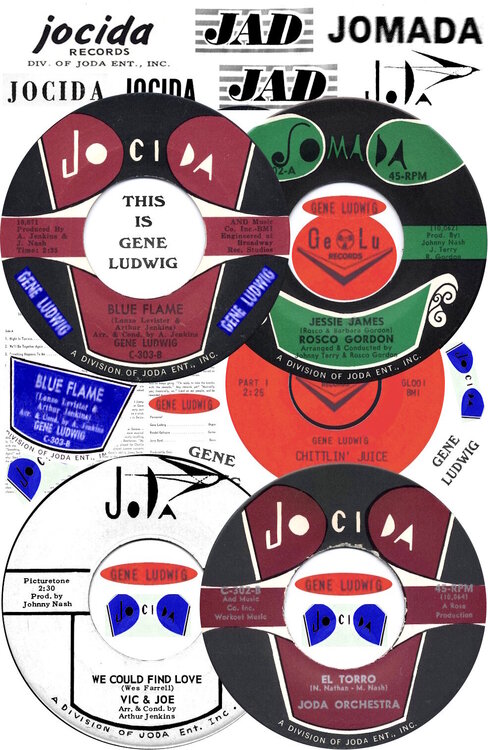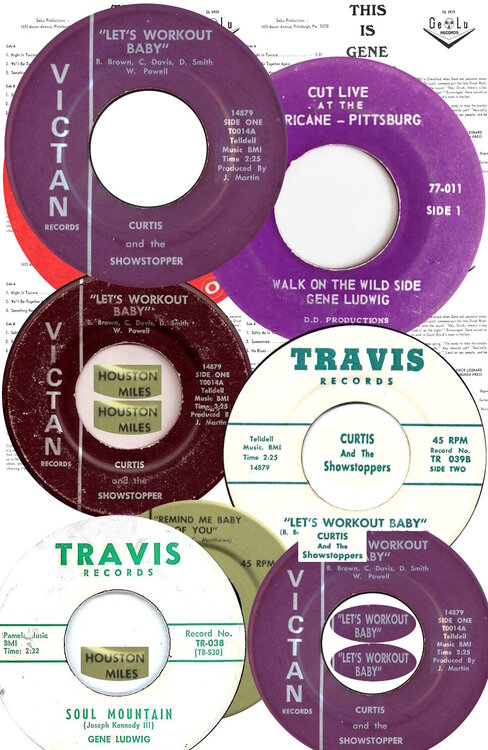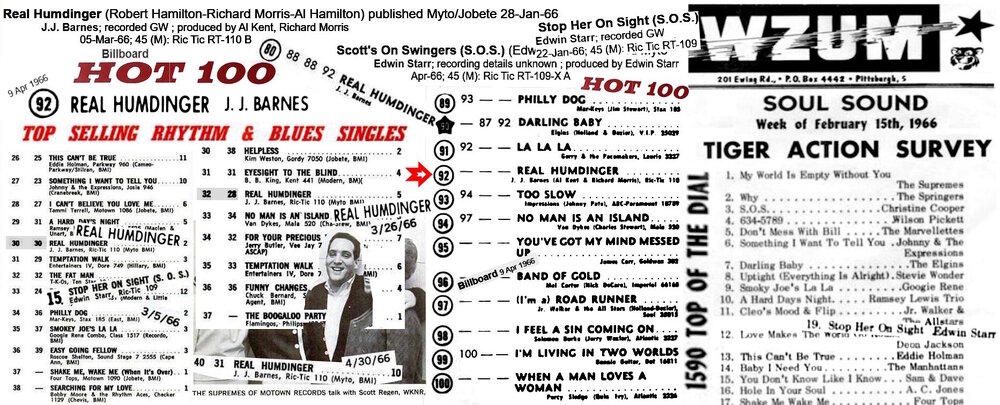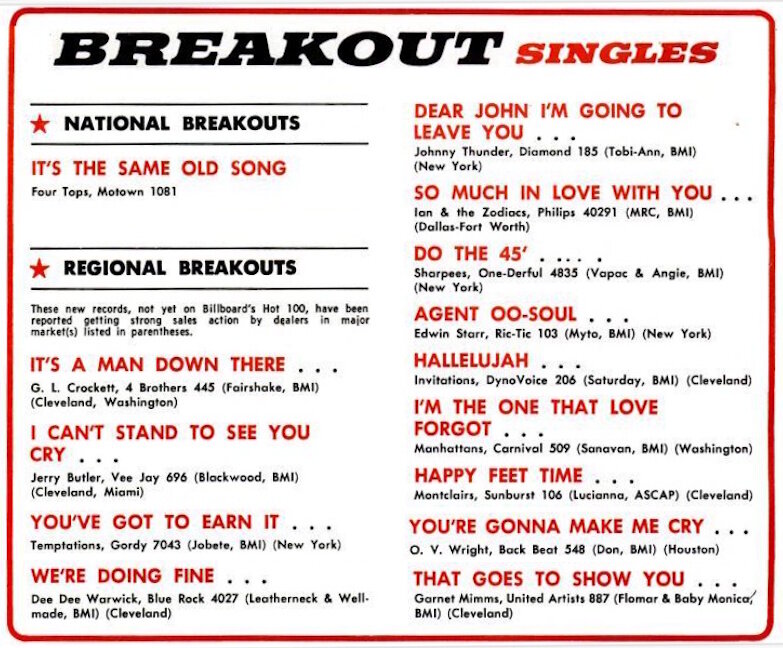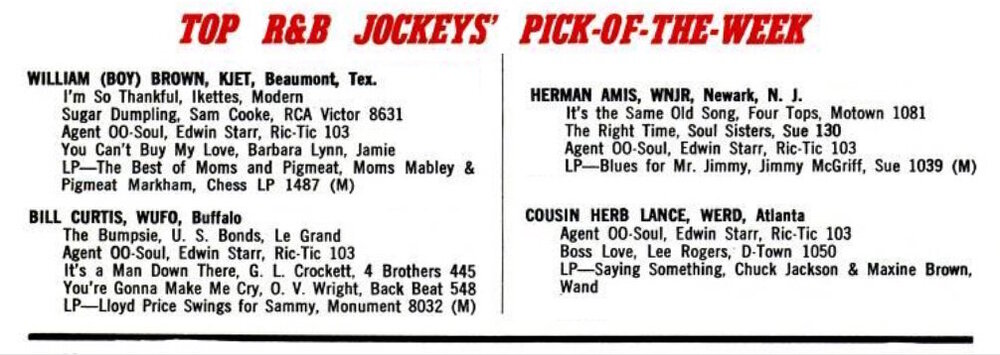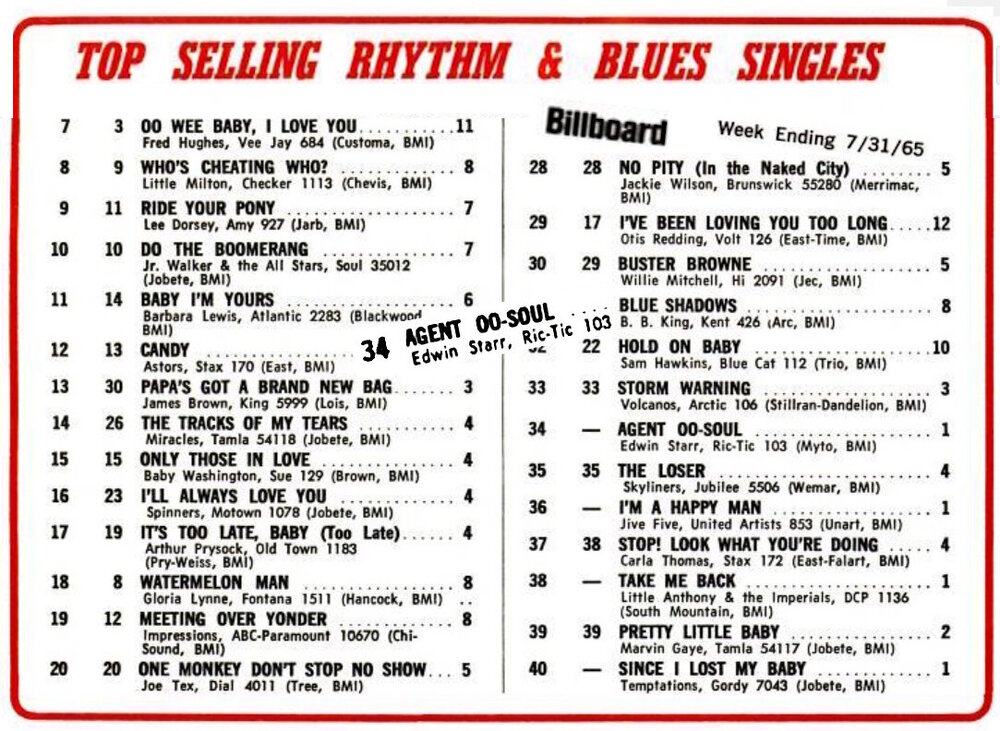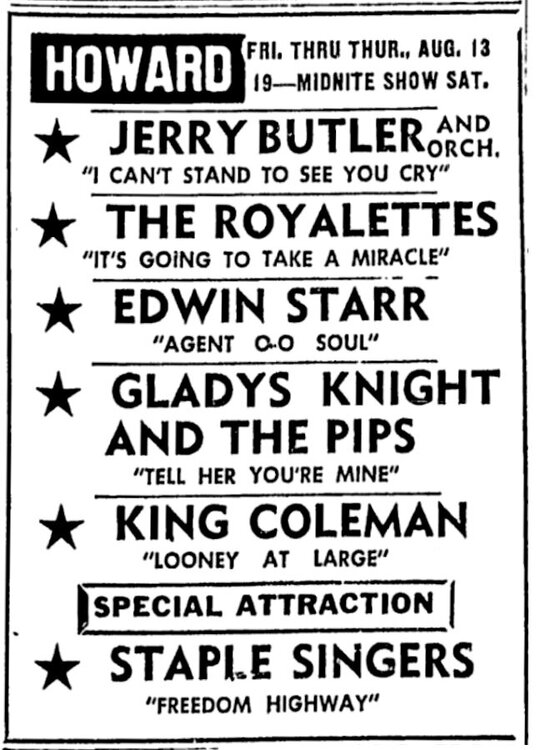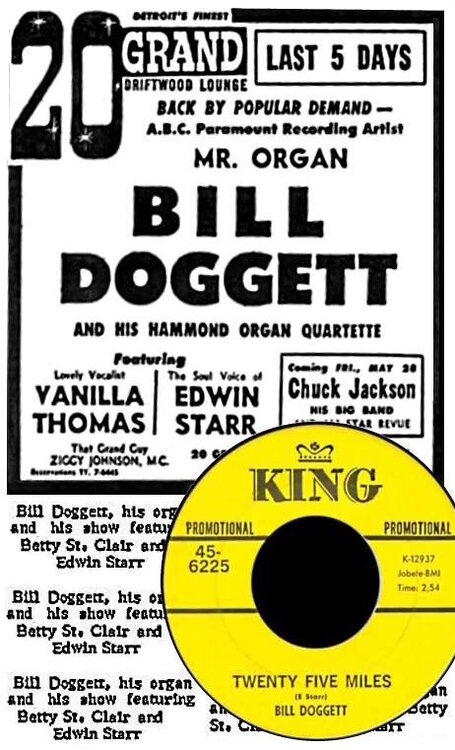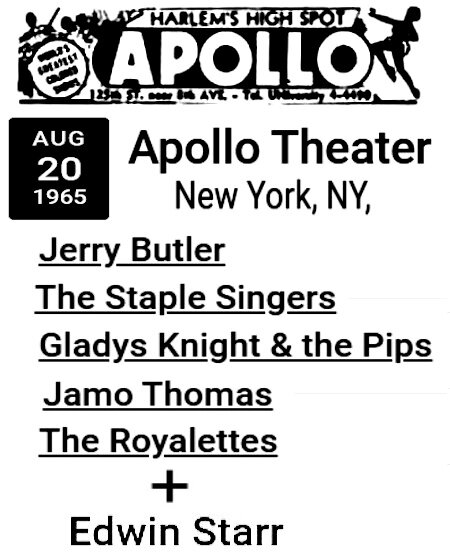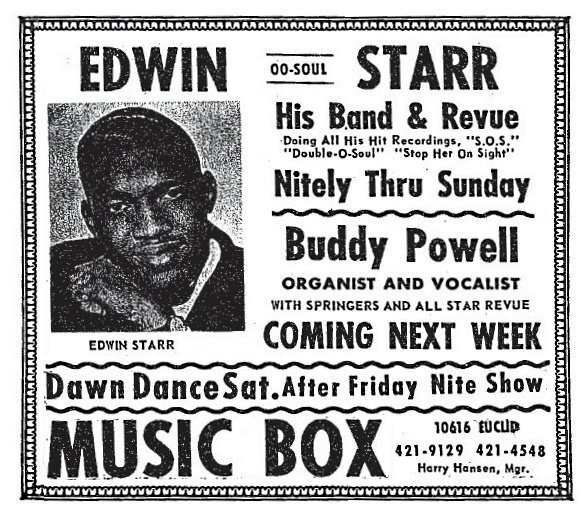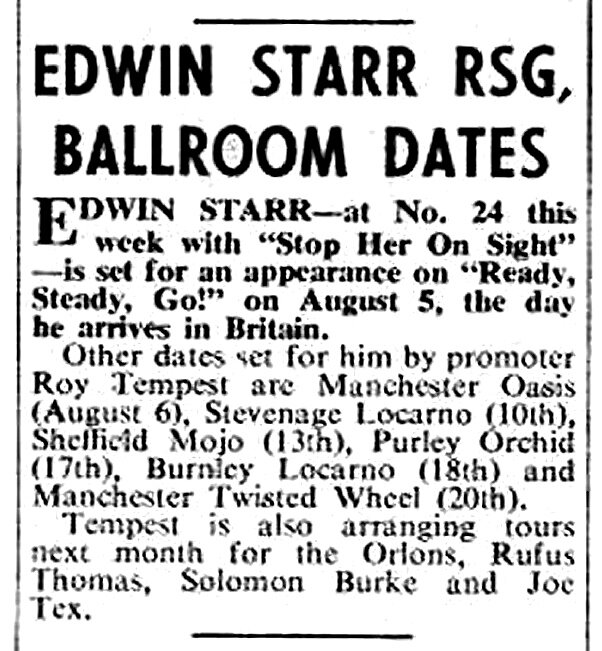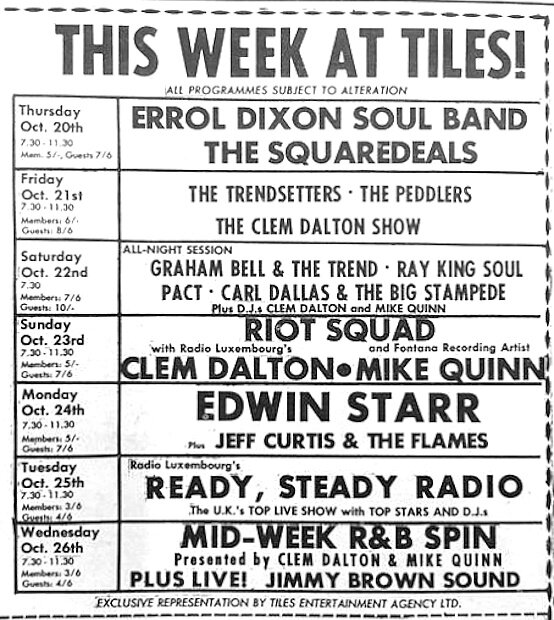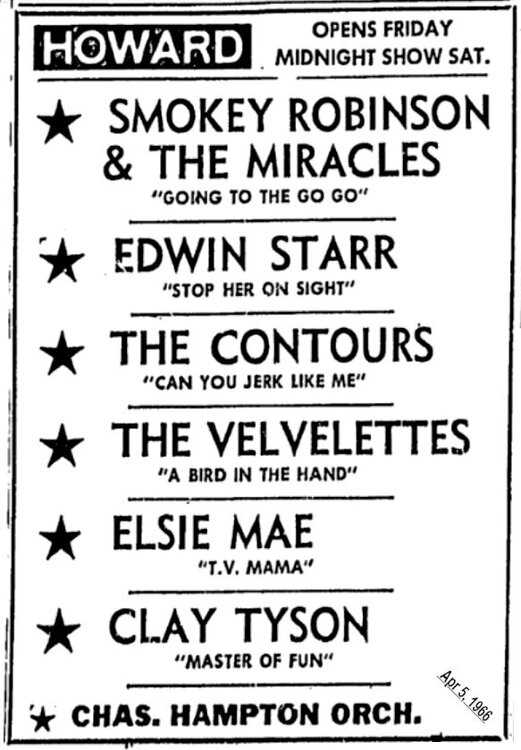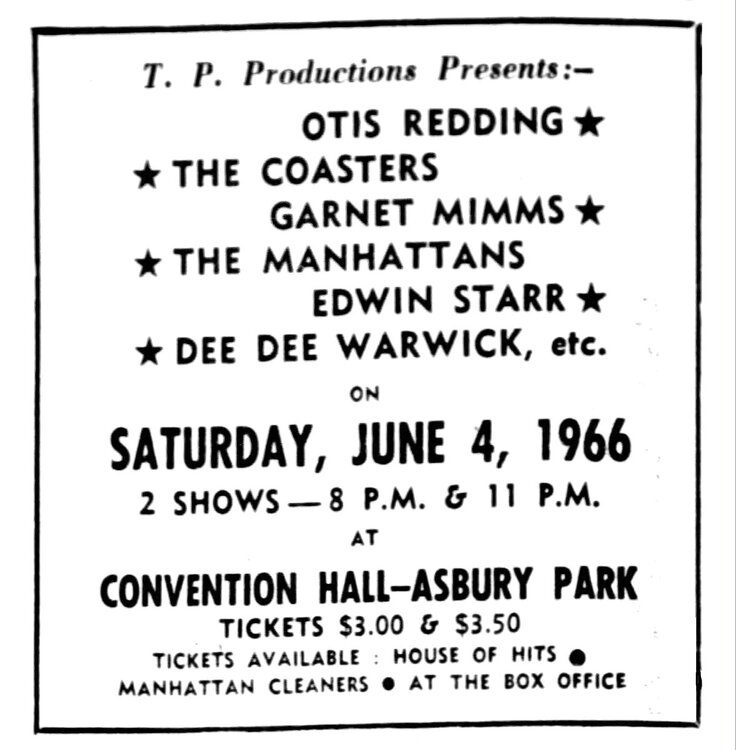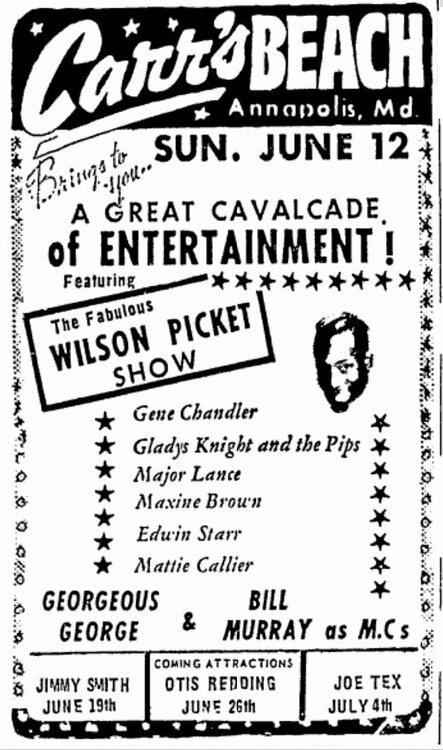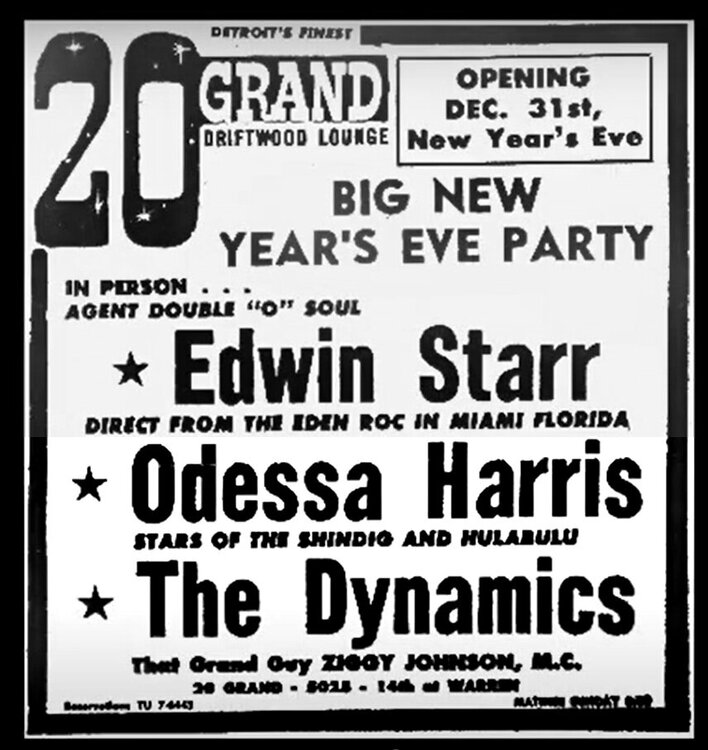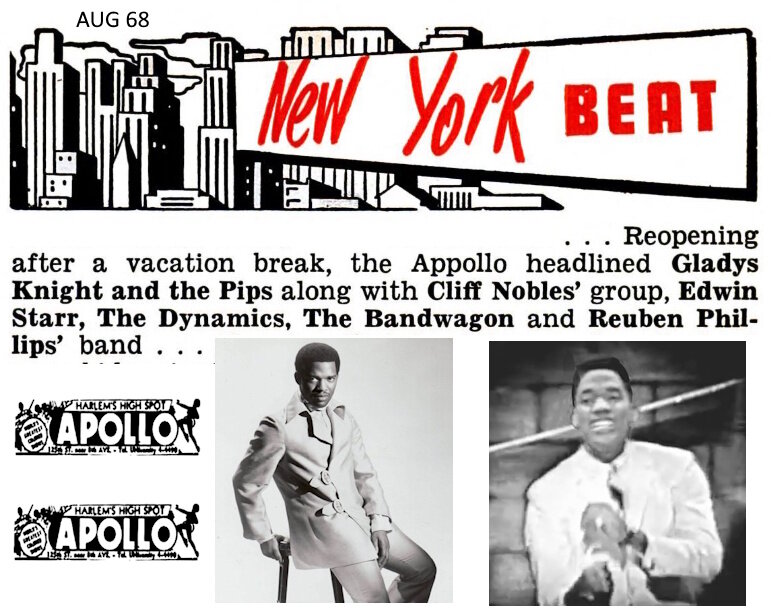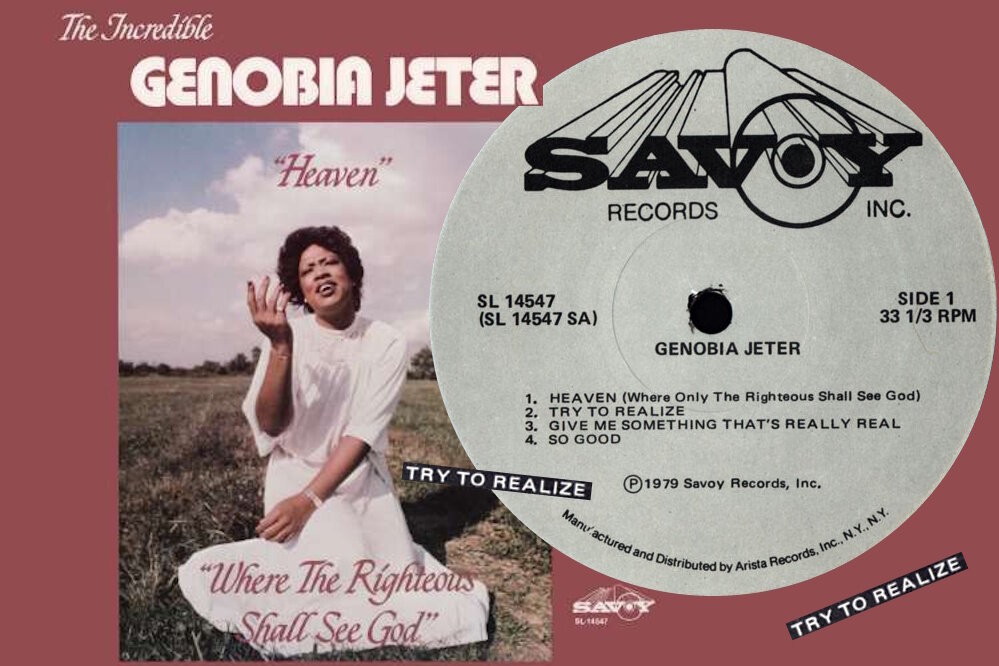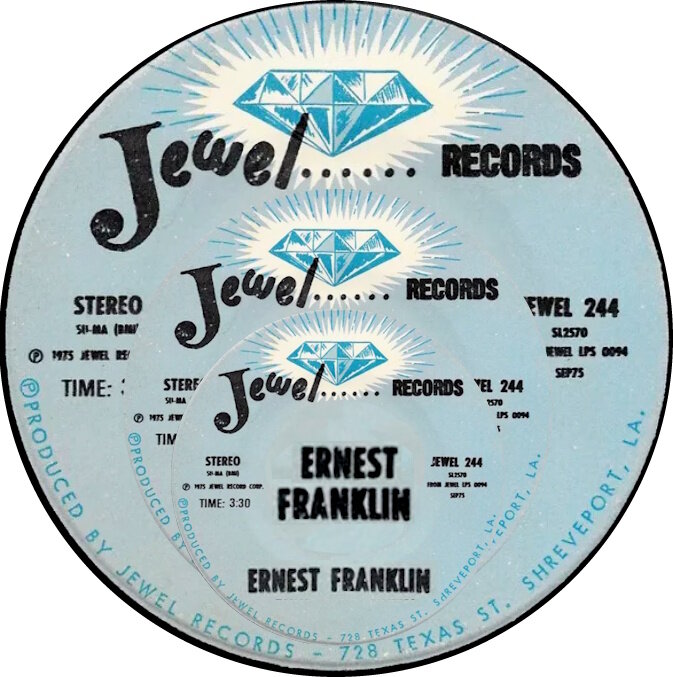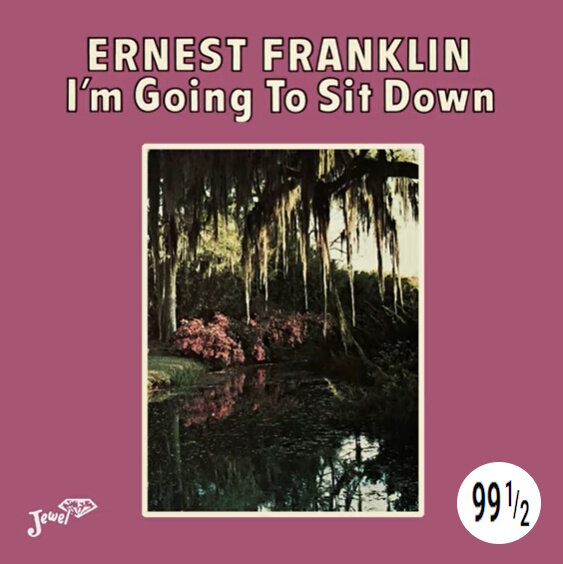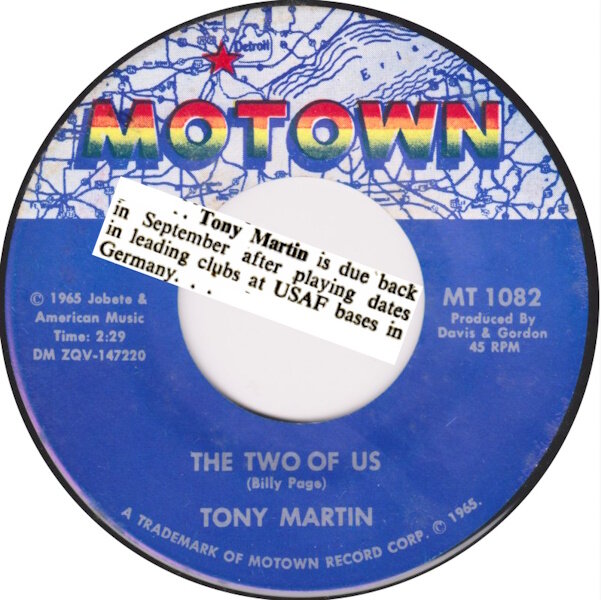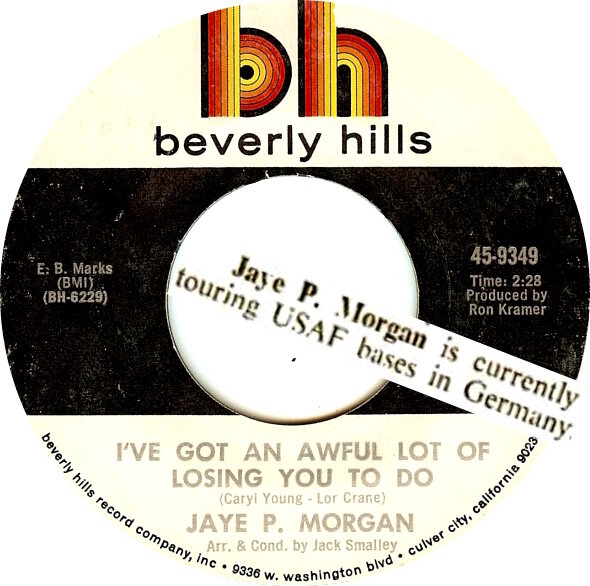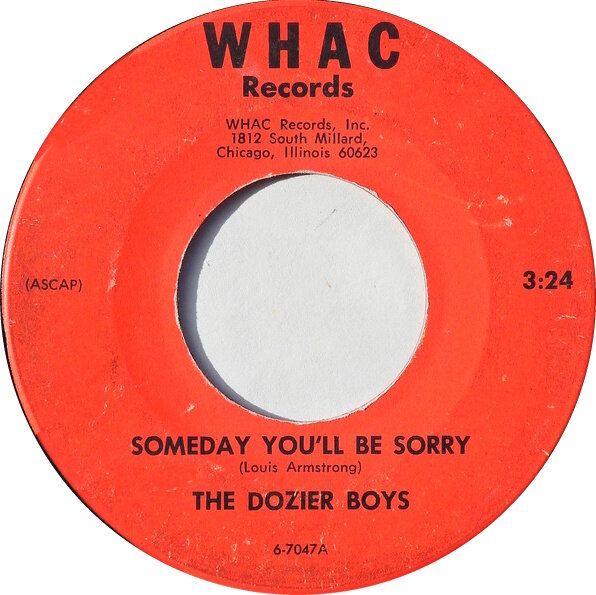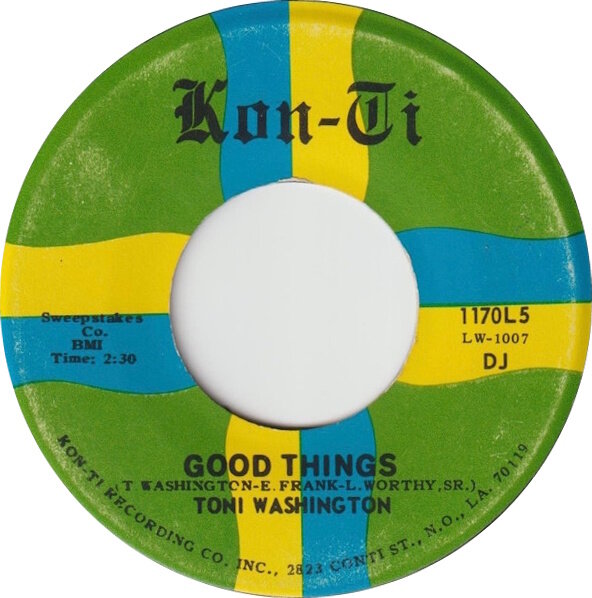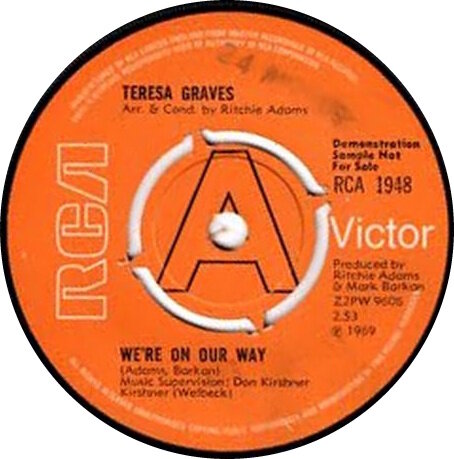Everything posted by Roburt
-
JAD & the Pittsburgh / New York Connection
Chuck (Corby) has got back to me to say that one of the guys in Curtis & the Showstoppers (Rodney Allen) was with him as a member of his backing group, the Entrees. Rodney now lives in LA. Chuck also knew Gene Ludwig really well.
-
JAD & the Pittsburgh / New York Connection
It was Odell Bailey who sent Chuck Corby & his then group (Four Plus One) to Golden World in Detroit to cut the songs Chuck had written -- “Man Loves Two” & “Happy Go Lucky”.
-
JAD & the Pittsburgh / New York Connection
What Sir Shambling has to say about Vic & Joe .... no bio info ... but the arranger on their track was Arthur Jenkins, so it must have been cut in New York ... Arthur Jenkins was a jazz based keys player, so he might have brought Gene Ludwig to Jocida. Arthur Jenkins was (later) in the group Cousin Ice that had lots of releases (they cut a house version of "Can I Get A Witness" among other things). https://sirshambling.com/artists_2012/V/vic_joe/index.php
-
JAD & the Pittsburgh / New York Connection
A couple of the tracks shown above ...
-
JAD & the Pittsburgh / New York Connection
JAD Records was a record label that was co-owned by Johnny Nash, producer Arthur Jenkins, and businessman Danny Sims, whose initials formed its logo. JAD Records Co. Inc. was located 221 West 57th Street, New York, NY 10019. They cut lots of their tracks @ Broadway Recording Studio (1697 Broadway, NY). Johnny Nash had been in the recording biz a long time; his 1st US 45 escaping in 1956, with his 1st UK release following in 1957 (Ladder Of Love on HMV). He went through lots of style changes & had releases on many US labels (ABC, Warners, Groove, Argo, Cadet, Atlantic, MGM, Epic). He first started Joda in 65 with Jad following in 68 (they also used the Jomada & Jocida label names). You'd think with a long musical pedigree, his big hits around the world, his connections in the biz (Lloyd Price, Howard Tate, Kim Weston, Don Covay & many more) + his links with reggae / Bob Marley from 1968, that everything would be known about his career / his recording work. BUT there a large gaps in knowledge right thru his time in the biz -- 1953 thru to 2006. He was born in Houston & initially made his name on a TV show in 1953. He was recording from 1957 and also made a name for himself as an actor. The period I'm focusing on here are his Joda & Jad days; 1965 to 1970. He was working out of New York & (then) Jamaica / New York in that period, collaborating with the likes of Arthur Jenkins, Gerry Thomas (of the Fatback Band) and others. For Jocida, he signed & recorded Pittsburgh based (white) jazz organist Gene Ludwig. How that connection came about I'm totally in the dark about. He also signed better known names to his labels' Lloyd Price, Howard Tate, Kim Weston, Gloria Gaynor, Rosco Gordon, Larry Santos, Johnny Daye, Sam & Bill, Bill Johnson (half of Sam & Bill), the Jamaican artists, etc. But lots of 'unknowns' also had releases on his labels -- Vic & Joe, Joe Richardson (Groundhog), the Jodarettes & the Joda Orchestra (both probably just studio based outfits). Before being signed to Jocida, Gene Ludwig had been a constant on the Pittsburgh club / recording scene (mainly on the jazz side of things. But he must have collaborated with some of the other acts that recorded for the same local labels as himself -- acts such as Curtis & the Showstoppers for instance. Anyone here shed light on some of the lesser known details from this period ?
-
REAL HUMDINGER - EDWIN STARR (WEST GRAND)
Seems the Fantastic Four must have been GW's 'go to' group for backing vocals in late 65 / early to mid 66 -- the group's first release in their own right coming out in Aug 66 (Ric Tic #119). They were on background vocals on "Scotts On Swingers" & Chuck Corby told me they were also on background when his group (Four Plus One) cut their Gene Redd / Detroit version of "Man Loves Two" around April / May 66.
-
Andy Pebbles: R.I.P.
Radio 1 DJ and presenter Andy Peebles dies aged 76 - BBC News https://www.bbc.co.uk/news/articles/cq5zx32163po
-
REAL HUMDINGER - EDWIN STARR (WEST GRAND)
DFTMC info on JJ's version of Real Humdinger & Edwin's tracks cut around the same time .... Edwin's "Stop Her On Sight" & JJ's "Real Humdinger" were on the US R&B chart at the same time, "Stop Her On Sight" making that chart a week ahead of JJ's cut. "Stop Her On Sight" looks to have been recorded on 22nd Jan 66, with JJ's "Real Humdinger" being laid down in the studio on 28th Jan. So that would mean Edwin's take on "Real Humdinger" being attempted on the 27th / 28th Jan I guess. So Edwin must have had a gig he needed to catch a plane to on Saturday 29th Jan (the BIG GIG NIGHT of each week always being on Friday & Saturday nights of course). JUST IN PASSING: Edwin had a big seller in the UK with "Headline News", but in the US the track wasn't that successful for him -- peaking @ No.84 pop & not even making the R&B chart.
-
REAL HUMDINGER - EDWIN STARR (WEST GRAND)
All info about those times helps in a small way to promote the new 45 ... ANY PUBLICITY (discussion) IS GOOD PUBLICITY.
-
REAL HUMDINGER - EDWIN STARR (WEST GRAND)
A few more Edwin related bits ... "00 Soul" really took off quickly ... it was making enough noise in July 65 for GW to put out a national ad for the 45. Also in July 65 it was a Breakout 45 right across the US (meaning it would get playlisted by most radio stns due to it's status -- even though the track was by an unknown artist on a small Detroit black owned record label). Same month it was a tipped track on quite a few R&B radio stns (in Detroit, Cleveland, Buffalo, New Jersey, Atlanta, Texas, etc.). It made it's entry onto the national R&B charts at the very end of the month ... AND BY ... mid August, Edwin had been added to the acts on a touring revue show (playing the Howard in DC for a week) ...
-
Groovettes on Anglo American and record buying in general
This track was masterminded by (Eu)Gene Dozier aka Billy Jackson. Gene had started off in Philly -- there he worked on quite a few sessions and wrote songs with Norman Johnson. A joint effort of theirs became (when separately finished) "Swoop Down On You" and "It Will Be Done". Gene thought the grass would be greener elsewhere & so after introducing himself to Mickey Stevenson backstage @ the Uptown Theatre, headed off to Detroit. There he took on the name of Billy Jackson (who he knew was a 'known name' from Philly at Motown). He worked on sessions for songs such as "Uptight" and wrote some songs himself (the Marvelettes having one of these released on a later LP). But G & Huff came to town & revealed his deception. So he left Motown & went across town to work with Golden World / Solid Hit (for Pat Lewis, Theresa Lindsey tracks, etc). But Gene soon decided to move on again, this time to LA. There he hooked up with a new musical partner (Santifer) & cut the Blossoms "Let Your Love Shine on Me" (October 66 release). He & his partner then met the girls in the Groovettes & took a fancy to them (they were very attractive young ladies). So they cut them on one of Gene's songs "Think It Over Baby" (written back in Detroit under his assumed name Billy Jackson). This was put out on Reness. I met & spent a couple of days with Gene in Vegas in the mid 90's and got the above info direct from him.
-
REAL HUMDINGER - EDWIN STARR (WEST GRAND)
MORE INFO ON EDWIN'S WORK @ THAT TIME; from an old article of mine + the tinternet ... Detroit DJ LeBaron Taylor introduced Edwin Starr to Ed Wingate and he signed Starr to a recording contract with GW. “Agent Double-O-Soul” was written by Edwin in New York in down time while fronting Bill Doggett's Band around April 65. Edwin went to see the current James Bond movie, watching it through 3 times and was inspired to pen the song. The track was produced by Richard Parker at GW and arranged by both Starr and Sonny Sanders. Released in the summer of 1965, as the anticipation for the new James Bond movie, Thunderball, was starting to build. Starr’s debut single went all the way to # 8 on the Billboard R&B chart and reached # 21 on the Hot 100. The session for “Agent Double-O-Soul” was the first for future Funk Brother bassist Bob Babbitt. The fact that he was a classically trained musician came in handy when he was asked to read the introduction, which had been written out note for note by arranger Sonny Sanders. “If I hadn’t been able to read that, I don’t think they would have called me back”, Babbitt stated. “All of a sudden they were calling me about everything over there.” Babbitt’s distinctive bass line was a major factor in the single’s success. With an instant solo hit on his hands (Double-O-Soul), Edwin had to immediately put together a backing band so that he could tour to cash in on his new found success. He didn’t really know too many available musicians in Detroit, so it was only natural that he went back to Cleveland (where he'd started his musical career) to recruit the backbone of his needed line-up. While scouting out members for his tour band, he sought out lots of his old friends from his days in Cleveland. In no time at all he had persuaded Gus Hawkins and Julius Robertson to go on the road with him. The pair stayed with him for some time before they eventually tired of living out of a suitcase and returned home to Cleveland. Starr also wrote his follow-up single song, “Back Street”, released in December of 1965. “Back Street” celebrated partying on the other side of the tracks. “That was pretty much a musical anthology of my life, the way I lived and how I lived and everything”, Starr said. “Back Street” was not as successful as “Agent Double-O-Soul”, however, as it peaked at # 33 on the R&B chart and only reached # 95 on the Hot 100. Ed Wingate used Motown’s Funk Brothers on Starr’s recordings. Berry Gordy fined any of the Funk Brothers that he caught moonlighting but that didn’t stop the practice from continuing. Both bassist James Jamerson and guitarist Dennis Coffey played on Starr’s next record, “Stop Her On Sight (S.O.S.)”. Edwin stated "a guy named Richard Morris helped with “Stop Her On Sight”. The whole idea of the song came from the television program 20,000 Leagues Under the Sea. I was watching that, and they did the Morse code thing on the TV show. And that’s where I got the intro for the record.” “Stop Her On Sight (S.O.S.)” was a Top Ten R&B hit, but it failed to make the Top 40 on Billboard’s Hot 100, peaking at # 48 in early 1966. FROM THE ABOVE, it seems very likely that some of the Funk Brothers played on the session that produced the backing track for REAL HUMDINGER.
-
REAL HUMDINGER - EDWIN STARR (WEST GRAND)
A few ads for / reports of Edwin's live shows back in the 60's ... 1st one in Detroit when he was still fronting Bill Doggett's Band (this is when he approached GW with his James Bond inspired song -- May 65) .... "00 Soul" hit big quickly & it seems he was added to a touring review for their final shows which were @ the Apollo (Aug 65) ... . . . then some 1966 (& later stuff) ... a US review tour he was on with Motown acts (which hit the Howard in DC in April 66), 2 shows in June 66 (one @ Carr's Beach) and then more assorted stuff including details of some of his UK gigs in 66. Edwin's 1st ever UK live show took place @ the Mojo in Sheffield, so the one shown below (Mojo: 13th Aug 66) must have been his 2nd appearance @ the club.
-
REAL HUMDINGER - EDWIN STARR (WEST GRAND)
Yes, got my releases mixed up, it was "Stop Her On Sight" that came out in January & was charting R&B wise in Feb 66. Theconcertdatabase listings contain extensive info on who was appearing @ the 20 Grand in Detroit from the 50's through the 60's. But for Edwin their 1st 2 entries are ... Christmas Carnival 12/26/1965 @ IMA Auditorium, Flint, Michigan . . . . AND The Swingin' Time Review 07/20/1966 Fox Theatre, Detroit, Michigan .... so no info on the shows he undertook from Xmas 65 thru July 66. I know there's an on-line data base that lists the recording dates for all Motown tracks; does that extend to Ric Tic / GW stuff (such as Edwin's recordings) that became Motown's after the take over by BG ?
-
REAL HUMDINGER - EDWIN STARR (WEST GRAND)
In 1966 Edwin was soon enjoying additional success with his "Stop Her On Sight" (& then "Headline News") 45's. "SOS" was released in late Jan 66. It made the national R&B charts in early Feb and stayed on that chart for over 2 months. On the pop side, "Headline News" entered Billboard's Hot 100 in early May & had climbed to No.89 by 21st May. So no doubt, from Feb to June he would have been much in demand for live shows across the US. Doesn't help with what shows he was doing in Dec 65 & Jan 66 though (but he was obviously in the studio for a few days during that period). Brian Epstein booked Edwin to star at London's Saville Theatre on Feb 26th 1967 but that's way too late to be applicable in this conversation. Who was appearing @ NY Apollo was regularly reported in JET MAGAZINE, however (even though he would have performed @ the Apollo in 66 & 67), Edwin's 1st mention in the mag wasn't until 1968 (with that stating he was on at the Apollo in August).
-
REAL HUMDINGER - EDWIN STARR (WEST GRAND)
A BIT OF BACKGROUND INFO .... Edwin had his 1st US hit 45 in July 65. He was initially required to tour to promote the 45 and as it became a big hit in many different US cities, he was in demand to do shows in each of these. That also meant that he was a sought after name to be added to US package tour line-ups -- these playing cities such as Detroit, Chicago, Cleveland, LA and all the theatres on the east coast chitlin circuit (Royal, Howard, Uptown, Apollo, etc.). So Edwin undertook many live shows during 1965. Fast forward to 1966 --- that April 66, Edwin was touring across the US with the Miracles, Contours & Velvelettes. In June 66, he was part of the package tour with then new Motown act Gladys Knight & Pips. Edwin also visited the UK three times in 1966, undertaking an extensive UK tour in October 66. I believe the earlier visits were promotional affairs that also included a few club dates. If these promotional trips to the UK were at the behest of Polydor Records UK, then they were likely for a few days around May & August 66. What gigs Edwin was keen to head out of the Golden World studio to undertake around January 66 seems to have been lost in the mists of time (unless someone on here knows better) -- January 66 being the most likely time when he would have cut his version of "Real Humdinger" -- J J's version coming out in February 66. Anyone here have details of Edwin's shows in & around Detroit in Dec 65 / Jan 66/ Feb 66 as it could just as easily have been a show at somewhere like Phelps Mr. Kellys or the Flame that he was keen to get to as to a show in Cleveland or New York.
-
Uk record shops doc
Not watched it all yet so don't know if they do get a mention ..... But surely for UK soul 45 record buyers the likes of F L Moores and Contempo were the main players after Soul City went under but before Soul Bowl moved down from Glasgow. Ahead of the likes of Soul City being around, getting hold of US soul 45's was down to buying direct from the US (Ray Averys and Randys + discount warehouses -- if you could manage to get added to the list of folk who were sent their lists) ... OR .... bidding on auction lists you asked to be sent through the post from UK sellers (how they got hold of the many US soul 45's that were on their lists I never found out). And after Soul Bowl became a big player, the likes of Oldies Unlimited was a rival of sorts (although the quantity of rare label stuff they had was much smaller). For anyone who's managed to watch it all, do the likes F L Moores & Oldies Unlimited get a mention?
-
Gospel Tracks on the up ...
I got into Genobia Jeter via her 80's LP Genobia' (RCA) plus met her & her husband Glen Jones @ a Southport weekender. But she was making gospel records well before she crossed over to soul ...
-
Gospel Tracks on the up ...
In the 50's / 60's, lots of soul songs were 'developed' from popular gospel songs. By the 70's / 80's, the situation had completely changed around & gospel acts were doing their versions of soul songs. The likes of Rance Allen and Maceo Woods certainly following this path. But lots of other gospel acts also did the same ...
-
Gospel Tracks on the up ...
Lots of the gospel tracks put up on this thread are up tempo dance items ... NOT the Mildred Clark just above though ... here's one that also doesn't qualify as a dancer; to me it has more of a deep soul feel to it ...
-
Gospel Tracks on the up ...
-
USO arranged Tours of UK / European USA military bases
QUOTE from my 1st post on this thread ... seems those employed at the USO had a 'white bias' back then. THIS IS BACKED UP by this from James Brown about his trip to Viet Nam to entertain the troops ... James Brown says that it was Bob Hope himself, interestingly enough, who would clinch the Vietnam tour at the May, 1968 State Dinner: “[He] told some of the USO people, ‘If you’re going to get anybody to perform for the troops, James Brown is the man.” . . . The sad joke at the time was that “Armed Forces Radio Network offered two kinds of music: country and western.”
-
USO arranged Tours of UK / European USA military bases
I found a couple of mentions of singers playing USA military bases in Germany, none at present for UK shows. But these happened on a regular basis at places like Upper Heyford, Lakenheath & Mildenhall. It seems that such visits are still going on these days as well.
-
USO arranged Tours of UK / European USA military bases
It's very hard to track down info on which soul acts played UK USA military bases. With Viet Nam being much better reported, that's an easier task. Just some of those that played for troops in Viet Nam were ... Barbara McNair, Rosie Greer, Teresa Graves, Toni Washington, the Ink Spots, Anita Bryant, Jackie DeShannon and more ... as already stated Joey Heatherton, the Dozier Boys & Lola Falana played shows there too.
-
USO arranged Tours of UK / European USA military bases
A few related videos ... Disc Jockey selects and plays record at AFN (American Forces Network) studio in B... this one is a film version I guess ...

